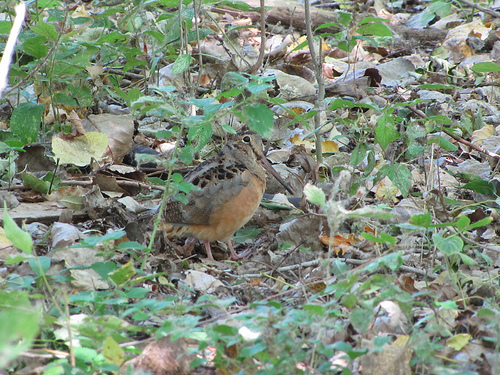Early last evening, I went for a Woodcock Walk sponsored by the North Branch Nature Center. We were there to observe the aerial displays of the American Wood cock, and our leader, Larry, told us — “They’ll start about ten of eight so we can go over and visit the pond where all the Spring Peepers are first.” I must say I did not share his certainty but I also had never been on a walk like this before.
In true naturalist fashion, he introduced our small group to some caterpillars, a non-lightning bug, several types of spring ephemeral flowers, and hundreds of randy frogs. As one who tends to move too fast in the woods, it always amazes me at the sharp-eyed observation of people who notice insects, plants, as well as birds.

Woodcocks are usually very hard to spot on the ground. Our guy was right out in the open. Photo by aecole2010
We ambled up into the large field as it darkened and just about 8 PM, we heard the first “pent” call. The bird makes this call on the ground, and rotates between calls, to send it in different directions. We heard two males calling and waited to see if they would fly. They are normally well-hidden in the brush and grass but we noted a dark shape up ahead on the mowed path and through the binoculars, saw a Woodcock. About then, he took off, climbing crazily in a circular pattern above us, sending out a whistling/twittering call, until he was out of sight, and then came spiraling back down, landing right on the spot he started from. It reminded me of a slightly out-of-control model airplane with furious flapping wings, and a deft pilot at the controls. It killed by pinched nerve neck to watch but was worth it.
The other guy seemed to fly less but our Timberdoodle flew about every five minutes for about a half hour. It was getting very dark and we quit before he did.
It was a wonderful outing — and I learned that this goes on for weeks during the spring, even after the females have started nesting. We were really impressed with the display of our little flyer. I hope the females waiting in the wings were as well.
Discover more from Vermont Birder
Subscribe to get the latest posts sent to your email.
